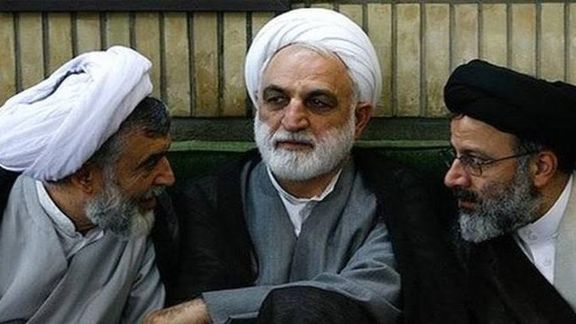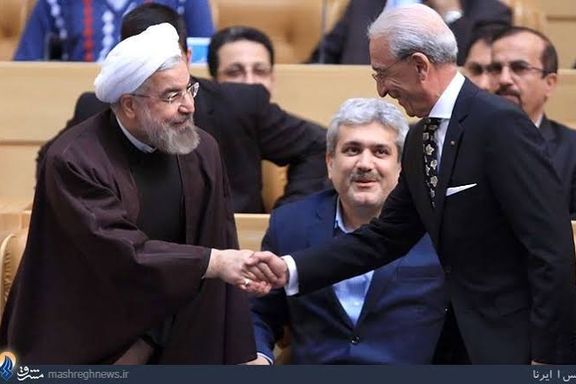Questions Abound Over German Clinic Admitting Iranian ‘Hangman'

Reports about a serious human rights violator from Iran being treated in a private clinic in Germany have stirred sharp controversy among Iranians and German media.

Reports about a serious human rights violator from Iran being treated in a private clinic in Germany have stirred sharp controversy among Iranians and German media.
Iranian opponents of the Islamic Republic on Monday accused the Hanover-based International Neuroscience Institute of expunging the patient record of the “hanging judge” Hossein-Ali Nayeri who was involved in the massacre of hundreds of political prisoners in 1988.
Germany’s largest paper, the mass circulation Bild, reported that INI deleted Nayeri’s medical record in apparent move to avoid a new pro-Iran regime scandal. The director of the INI, Dr.Madjid Samii, scrambled to deny the allegation that he was caught again treating a regime official responsible for severe human rights abuses.
“There are currently no patients from Iran at the INI. These allegations damage our reputation, and not for the first time,” said Samii, according to the regional paper HAZ.
Samii, who was born in Tehran in 1937, faced widespread outrage in 2018 for providing care to Ayatollah Mahmoud Hashemi Shahroudi at INI. Shahroudi headed the Islamic Republic’s opaque judiciary from 1999 to 2009 and imposed executions on 2,000 people, including adolescents. Germany’s government permitted Shahroudi to leave the country after his treatment.

Samii told the HAZ that “As a doctor, I have an obligation to treat every patient, even it is Putin.”
Jason Brodsky, policy director of the US-based United Against a Nuclear Iran (UANI), tweeted a report from the German paper Die Welt that said “According to eyewitnesses, two vehicles with license plates of the Embassy of the Islamic Republic of Iran were in the parking lot of the clinic [INI]last Friday.”
The Iranian-German dissident, Dr. Kazem Moussavi, told Iran International that Samii is a “well-known friend of the mullahs” and also treated former Iranian regime judge Gholamreza Mansouri in 2020. Mansouri incarcerated 20 journalists during his tenure. The regime-controlled Young Journalists Club reported at the time that Mansouri “is said to be hospitalized in Professor[Majid] Samii's hospital in Germany.”
Moussavi added, “As an Iranian member of the opposition and spokesman for the Green Party of Iran in Germany, I sharply criticize the Federal government and Green Foreign Minister Annalena Baerbock for regrettably turning Germany into a secret place of treatment for the mullahs' death judges. He [Nayeri] is being treated in a German city of all places, in Hanover, where the Germanpolitical hostage awaiting his execution in Tehran, Jamshid Sharmahd, lived with his family.”
Moussavi said the German “Federal government must end its appeasement policy” toward Iran’s regime and called for the immediate arrest of Nayeri.
The Bild paper also took the German government to task for its policies that reportedly placate Tehran’s rulers. “Sweden shows that there is another way: Hamid Nouri, a member of the Islamic Revolutionary Guards and Nayeri’s assistant, was arrested [in Sweden] in 2019. Despite protests from Tehran, Nouri was sentenced to life imprisonment in 2021 for torture and murder.”
Moussavi said that Nayeri ”has served as chief adviser to the Islamic Republic's death judge, Gholam-Hossein Mohseni-Ejei, since Ebrahim Raisi's presidency. Both are directly responsible for the political prisoners and those executed in the ‘Woman, Life, Freedom’ protests in Iran.”
The Bild reported that Iranians, who live in Germany and were victimized by Nayeri, filed criminal complaints against the cleric and judge. The human rights activist Mina Ahadi told the paper “Many of his traumatized victims are here in Germany, you meet them everywhere.”
Amnesty International classified the 1988 massacre as a “crimes against humanity” in which the regime slaughtered at least 5,000 political prisoners. Nayeri issued summary executions to hundreds of political prisoners at Evin and Gohardasht prisons.
The Iran People’s Tribunal on Monday wrote on its website that it filed a case against Nayeri at the Berlin Prosecutor’s Office. Four witnesses are part of the Tribunal’s case who were taken to Nayeri’s “Death Committee” in 1988. The Tribunal said the Berlin Prosecutor forwarded the case to the Hanover Prosecutor who assigned the police to investigate. The police said Nayeri had not been admitted to the INI.

Mizan, an Iranian regime-controlled news agency affiliated to the judiciary, denied that Nayeri visited Germany.
Sheina Vojoudi, an Iranian dissident in Germany, termed Germany’s conduct toward admitting Iranian regime officials accused of grave human rights violations a “double standard.”
She said, “How can Germany express its concern about human rights violations in Iran, yet let the human rights abusers who are responsible for thousands of innocent lives be hospitalized in Germany while there is no way for the persecuted Christians or political activists to apply for a German visa.”
She continued, “These ayatollahs who have been treated on German soil issued thousands of death sentences to innocent Iranians. Arresting these human rights abusers for their crimes against humanity is the least expected when they enter a democratic country.”
Vojoudi, an associate fellow for the Gold Institute for International Strategy, argued that “Iranian refugees in Germany fled to save their lives from the same Ayatollahs who always come to Germany for the best treatment.”
Iran International sent numerous press queries to the INI and the German Foreign Ministry.